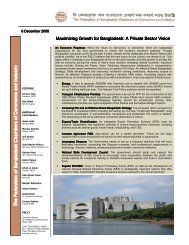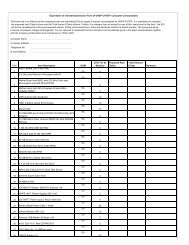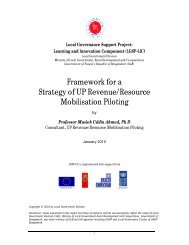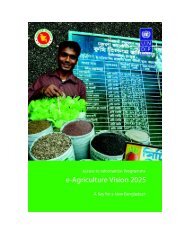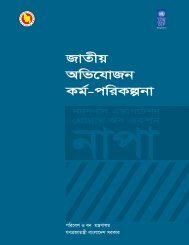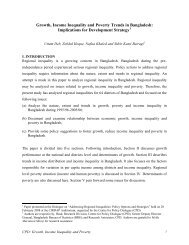The probable impacts of climate change on poverty - UNDP
The probable impacts of climate change on poverty - UNDP
The probable impacts of climate change on poverty - UNDP
Create successful ePaper yourself
Turn your PDF publications into a flip-book with our unique Google optimized e-Paper software.
and have little capacity to adapt to such shocks. <str<strong>on</strong>g>The</str<strong>on</strong>g>y are also more dependent <strong>on</strong> ecosystem services and<br />
products for their livelihoods. Any impact that <str<strong>on</strong>g>climate</str<strong>on</strong>g> <str<strong>on</strong>g>change</str<strong>on</strong>g> has <strong>on</strong> natural systems therefore threatens the<br />
livelihoods, food intake and health <str<strong>on</strong>g>of</str<strong>on</strong>g> poor people. Loss <str<strong>on</strong>g>of</str<strong>on</strong>g> employment and <str<strong>on</strong>g>impacts</str<strong>on</strong>g> <strong>on</strong> assets are likely to<br />
reduce opportunities for educati<strong>on</strong> in several ways. During the natural disaster and post-disaster period children<br />
may be required to help more with household tasks leaving less time for schooling. Even catastrophic cycl<strong>on</strong>e<br />
and storm surges damage school facilities and educati<strong>on</strong>al materials.<br />
<str<strong>on</strong>g>The</str<strong>on</strong>g> United Nati<strong>on</strong>s Development Programme (<strong>UNDP</strong>) has undertaken a project “Support to M<strong>on</strong>itoring Poverty<br />
Reducti<strong>on</strong> Strategies and Millennium Development Goals (MDGs) in Bangladesh” to enhance the instituti<strong>on</strong>al<br />
capacity <str<strong>on</strong>g>of</str<strong>on</strong>g> the government’s General Ec<strong>on</strong>omic Divisi<strong>on</strong> (GED) as the Nati<strong>on</strong>al Poverty Focal Point. Under this<br />
project, Planning Commissi<strong>on</strong> under the Ministry <str<strong>on</strong>g>of</str<strong>on</strong>g> Planning has carried out a research <strong>on</strong> “<str<strong>on</strong>g>The</str<strong>on</strong>g> Probable<br />
Impacts <str<strong>on</strong>g>of</str<strong>on</strong>g> Climate Change <strong>on</strong> Poverty and Ec<strong>on</strong>omic Growth and the Opti<strong>on</strong>s <str<strong>on</strong>g>of</str<strong>on</strong>g> Coping with Adverse Effect <str<strong>on</strong>g>of</str<strong>on</strong>g><br />
Climate Change in Bangladesh.” Bangladesh Centre for Advanced Studies (BCAS) has undertaken this research <strong>on</strong><br />
behalf <str<strong>on</strong>g>of</str<strong>on</strong>g> the General Ec<strong>on</strong>omic Divisi<strong>on</strong>. <str<strong>on</strong>g>The</str<strong>on</strong>g> overall objective <str<strong>on</strong>g>of</str<strong>on</strong>g> the project is to enhance instituti<strong>on</strong>al capacity<br />
<str<strong>on</strong>g>of</str<strong>on</strong>g> the General Ec<strong>on</strong>omic Divisi<strong>on</strong> to resp<strong>on</strong>d to the planning perspectives <str<strong>on</strong>g>of</str<strong>on</strong>g> the dynamically evolving socioec<strong>on</strong>omic<br />
circumstances under changing <str<strong>on</strong>g>climate</str<strong>on</strong>g>.<br />
This study has employed both qualitative and quantitative assessment approaches and used primary and<br />
sec<strong>on</strong>dary data and informati<strong>on</strong>. Understanding the relati<strong>on</strong>ship between <str<strong>on</strong>g>climate</str<strong>on</strong>g> <str<strong>on</strong>g>change</str<strong>on</strong>g> and <strong>poverty</strong> was <strong>on</strong>e<br />
<str<strong>on</strong>g>of</str<strong>on</strong>g> the key areas. It has been d<strong>on</strong>e through analyzing available <strong>poverty</strong> data and informati<strong>on</strong> and informati<strong>on</strong> <strong>on</strong><br />
<str<strong>on</strong>g>climate</str<strong>on</strong>g> <str<strong>on</strong>g>change</str<strong>on</strong>g> and its <str<strong>on</strong>g>impacts</str<strong>on</strong>g> <strong>on</strong> different sectors. Another area <str<strong>on</strong>g>of</str<strong>on</strong>g> the study was to understand <str<strong>on</strong>g>impacts</str<strong>on</strong>g> <str<strong>on</strong>g>of</str<strong>on</strong>g><br />
<str<strong>on</strong>g>climate</str<strong>on</strong>g> <str<strong>on</strong>g>change</str<strong>on</strong>g> <strong>on</strong> ec<strong>on</strong>omic growth which has been d<strong>on</strong>e through analysing major sectors c<strong>on</strong>tributing to<br />
ec<strong>on</strong>omic growth and their <str<strong>on</strong>g>impacts</str<strong>on</strong>g> due to <str<strong>on</strong>g>climate</str<strong>on</strong>g> <str<strong>on</strong>g>change</str<strong>on</strong>g>. Nati<strong>on</strong>al Strategy for Accelerated Poverty Reducti<strong>on</strong>,<br />
and Bangladesh Climate Change Strategy and Acti<strong>on</strong> Plan have been c<strong>on</strong>sulted to understand <strong>poverty</strong> and<br />
<str<strong>on</strong>g>climate</str<strong>on</strong>g> related policy aspect. Based <strong>on</strong> these analyses, the report c<strong>on</strong>tains required policy, and strategy to deal<br />
with adverse <str<strong>on</strong>g>impacts</str<strong>on</strong>g> <str<strong>on</strong>g>of</str<strong>on</strong>g> <str<strong>on</strong>g>climate</str<strong>on</strong>g> <str<strong>on</strong>g>change</str<strong>on</strong>g> in the c<strong>on</strong>text <str<strong>on</strong>g>of</str<strong>on</strong>g> <strong>poverty</strong> and ec<strong>on</strong>omic growth, as well as possible role<br />
<str<strong>on</strong>g>of</str<strong>on</strong>g> General Ec<strong>on</strong>omic Divisi<strong>on</strong>. In order to derive expert opini<strong>on</strong> <strong>on</strong> linkage am<strong>on</strong>g <str<strong>on</strong>g>climate</str<strong>on</strong>g> <str<strong>on</strong>g>change</str<strong>on</strong>g> adverse<br />
<str<strong>on</strong>g>impacts</str<strong>on</strong>g>, <strong>poverty</strong> and ec<strong>on</strong>omic growth, about 30 individuals have been interviewed from relevant sectors and<br />
two small expert group c<strong>on</strong>sultati<strong>on</strong>s have c<strong>on</strong>ducted. It is also to be noted that this report has been finalized<br />
through sharing with key stakeholders in a workshop and suggesti<strong>on</strong>s have been incorporated in the final<br />
report.<br />
<str<strong>on</strong>g>The</str<strong>on</strong>g> analysis from expert interviews revealed that reducti<strong>on</strong> <str<strong>on</strong>g>of</str<strong>on</strong>g> crop yield by gradual <str<strong>on</strong>g>change</str<strong>on</strong>g> and total or partial<br />
damage due to extreme events are key <str<strong>on</strong>g>impacts</str<strong>on</strong>g> facing by crop agriculture sector. It is also to be noted that most<br />
<str<strong>on</strong>g>of</str<strong>on</strong>g> the crops are affected at flowering to grain-filling stage and thus <str<strong>on</strong>g>impacts</str<strong>on</strong>g> vary by agro-ecological z<strong>on</strong>e. It has<br />
been revealed that 50% reducti<strong>on</strong> <str<strong>on</strong>g>of</str<strong>on</strong>g> crop producti<strong>on</strong> would increase <strong>poverty</strong> at the same percentage.<br />
Assessment <str<strong>on</strong>g>of</str<strong>on</strong>g> <str<strong>on</strong>g>impacts</str<strong>on</strong>g> <strong>on</strong> ec<strong>on</strong>omic growth is difficult to find but it appears that it could reduce 12% <str<strong>on</strong>g>of</str<strong>on</strong>g> GDP<br />
c<strong>on</strong>tributi<strong>on</strong> for a particular disaster. Effects <str<strong>on</strong>g>of</str<strong>on</strong>g> cycl<strong>on</strong>e are more severe than flood. <str<strong>on</strong>g>The</str<strong>on</strong>g> experts agreed that 60%<br />
damage <str<strong>on</strong>g>of</str<strong>on</strong>g> crop by a cycl<strong>on</strong>e increases <strong>poverty</strong> at the same percentage affecting their resources and livelihoods,<br />
and decreases ec<strong>on</strong>omic growth by 15% for the respective period. Thus, MDG 1 (Poverty eradicati<strong>on</strong> and hunger)<br />
is badly affected and pushed backward. Besides, drought, cold spell, river bank erosi<strong>on</strong> etc. have remarkable<br />
<str<strong>on</strong>g>impacts</str<strong>on</strong>g> <strong>on</strong> crop agriculture and c<strong>on</strong>sequently <strong>on</strong> <strong>poverty</strong> and ec<strong>on</strong>omic growth.<br />
In the fisheries sector <str<strong>on</strong>g>climate</str<strong>on</strong>g> <str<strong>on</strong>g>change</str<strong>on</strong>g> will have both negative and positive <str<strong>on</strong>g>impacts</str<strong>on</strong>g>. <str<strong>on</strong>g>The</str<strong>on</strong>g> positive impact is<br />
possible increase in the open water fisheries during flood. It appears that the <str<strong>on</strong>g>impacts</str<strong>on</strong>g> would not be remarkable<br />
in nati<strong>on</strong>al c<strong>on</strong>text rather it would affect investment at individual level. <str<strong>on</strong>g>The</str<strong>on</strong>g> key experts’ interviews and<br />
c<strong>on</strong>sultati<strong>on</strong> workshops revealed that flood and cycl<strong>on</strong>e affect culture fisheries severely while effects <str<strong>on</strong>g>of</str<strong>on</strong>g> other<br />
shocks such as drought, salinity intrusi<strong>on</strong>, erratic rainfall, heat wave, cold wave, fogginess is low to moderate. This<br />
leads to loss <str<strong>on</strong>g>of</str<strong>on</strong>g> livelihoods <str<strong>on</strong>g>of</str<strong>on</strong>g> the poor fishermen and decrease nutriti<strong>on</strong> status <str<strong>on</strong>g>of</str<strong>on</strong>g> the rural poor. Moreover,<br />
frequent warnings <str<strong>on</strong>g>of</str<strong>on</strong>g> cycl<strong>on</strong>e lead the fishermen to stay at home for l<strong>on</strong>ger periods and thus their income<br />
decreased which increased their <strong>poverty</strong> level.<br />
<str<strong>on</strong>g>The</str<strong>on</strong>g> c<strong>on</strong>sultati<strong>on</strong> with key experts’ state that livestock sector is badly affected by <str<strong>on</strong>g>climate</str<strong>on</strong>g> variability and shocks.<br />
xiv<br />
<str<strong>on</strong>g>The</str<strong>on</strong>g> Probable Impacts <str<strong>on</strong>g>of</str<strong>on</strong>g> Climate Change <strong>on</strong> Poverty and Ec<strong>on</strong>omic Growth and<br />
the Opti<strong>on</strong>s <str<strong>on</strong>g>of</str<strong>on</strong>g> Coping with adverse Effect <str<strong>on</strong>g>of</str<strong>on</strong>g> Climate Change in Bangladesh




